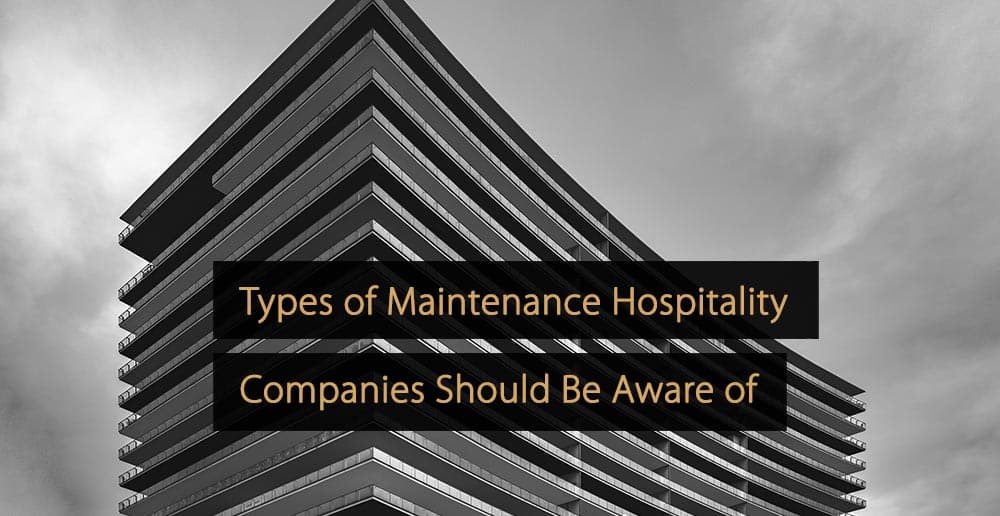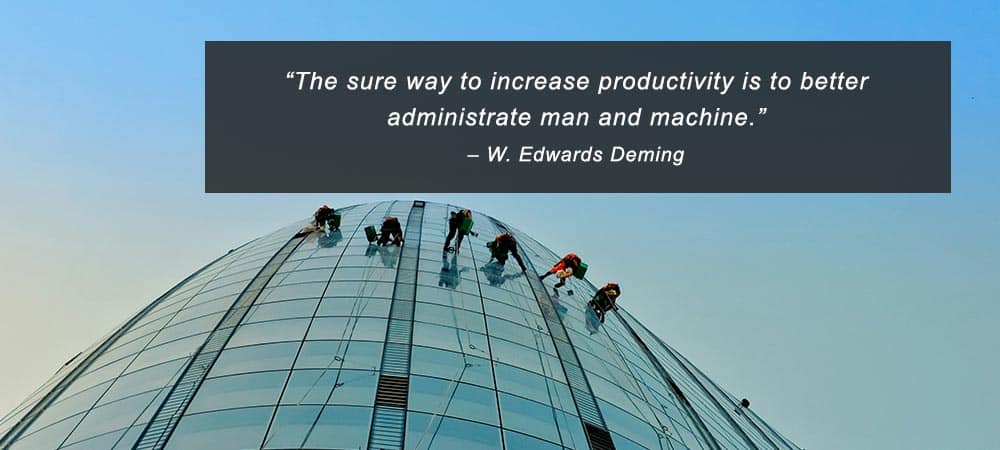Types of maintenance can be more of an issue than hoteliers anticipate. After all, the subject of maintenance spans everything from changing lightbulbs to modifying, improving, or removing pipes from within your hotel’s plumbing system. People often assume that maintenance is about ensuring objective functionality. However, maintenance is also important in terms of the guest’s satisfaction as it directly correlates with what guests feel during their stay at your hotel.
Table of Contents:
- What is Maintenance in the Hospitality Industry?
- Why is Maintenance in the Hospitality Industry Important?
- 6 Types of Maintenance in the Hospitality Industry
- Preventive Maintenance Fixes Problems Before They Occur
- Corrective Maintenance Fixes Problems after They’re Found
- Predetermined Maintenance Involves Careful Planning
- Condition-Based Maintenance Focusses on Observable Metrics
- Predictive Maintenance Leverages Fully Data-Drive Methodology
- Reactive (Run-to-Failure) Maintenance for Non-Critical Systems
- Choosing the Right Maintenance Strategy in Hospitality
- Types of Hospitality Maintenance Staff
- Optimizing the Types of Maintenance
- Types of Maintenance and Types of Technology
What is Maintenance in the Hospitality Industry?
Understing the types of maintenance begins by asking what maintenance in the hospitality industry actually entails. It’s easy to assume that the answer will be similar to home maintenance, but hotels are more complex ecosystems. It’s true that you’ll find maintenance elements that directly mirror home maintenance. For example, you’ll need to ensure refrigerators, cable, and electricity are working properly just as you would in your home. But you’ll also need to take care of unique elements of the hotel industry, like management systems or elevators.
Some familiar elements also become more challenging within the larger context of a hotel. Plumbing and air conditioning, for example, are very different things when you’re scaling a few rooms into a couple hundred or more. Indeed, it’s the need to scale maintenance to match guests that cause maintenance in the industry to become unique.
Why is Maintenance in the Hospitality Industry Important?
Hospitality maintenance is important on a basic level simply because it’s what keeps the facility running safely. However, maintenance also covers issues that could degrade the guest’s experiences such as anticipating issues with their comfort.
Consider, for example, what would happen if an issue with a hotel’s refrigeration caused it to run in a suboptimal level. This might not be enough to make frozen and refrigerated food unsafe. However, even a mild disruption could make food less tasty and enjoyable after preparation. And you’ll find similar with climate control, electricity, and more.
Even lighting can be an issue as guests might feel uneasy walking down dimly lit hallways without even realizing the cause. Routine maintenance catches all those before they can have a chance to escalate. And that’s why regular inspections and planning are a vital part of hotel maintenance.
6 Types of Maintenance in the Hospitality Industry
The complexity of the industry means that there’s a large number of specific maintenance types. However, this complexity can be more easily handled by classifying them all within the following six categories.
1. Preventive Maintenance Fixes Problems Before They Occur
Preventative, or proactive, maintenance is the flip side of reactive maintenance. Instead of reacting to a problem when it happens, you try to prevent it. Preventative maintenance is especially important as it helps to ensure guests aren’t bothered by the issues. Additionally, it helps balance workloads for the property’s staff. For example, reacting to a broken HVAC means that your team needs to go off their current projects to attend to the emergency. Likewise, guests are bothered by the disturbance in HVAC functionality. Proactive approaches avoid both issues through careful scheduling.
Video: What is Preventive Maintenance the Complete Guide
2. Corrective Maintenance Fixes Problems after They’re Found
Corrective maintenance is sometimes known as repair or breakdown maintenance because it focuses on fixing new problems. A defective system is identified and then fixed. Corrective maintenance is among the types of maintenance that help directly address problems noticed by guests. As such, it’s especially important within the hospitality industry. The process typically begins by tracking down the cause of the problem through diagnostic procedures. The defective elements are fixed according to the facility’s standard procedures. Finally, the newly repaired system is tested.
3. Predetermined Maintenance Involves Careful Planning
Predetermined maintenance is similar to scheduled maintenance. The main point of differentiation is that predetermined maintenance schedules are set by staff instead of the manufacturer. This is an important differentiation as it allows for staff to adapt manufacturing suggestions into individualized plans. Hospitality technology always adapts to the individual property. For example, one hotel might place an above-average load on climate control due to the area’s climate. That factor might increase the need for maintenance above what the manufacturer recommends. This usually manifests in hard rules for checking components along regular schedules.
4. Condition-Based Maintenance Focusses on Observable Metrics
Condition-based maintenance, or CBM, is based on action only after predefined conditions are met. In other words, maintenance is only done per specific conditions. The rise of CBM is one of the more important hospitality trends as it adds a dynamic element to maintenance. It helps promote timely intervention. For example, device X might be known to fail when metric Y drops below number Z. By monitoring for Z, the team can schedule maintenance well in advance of any actual problem. It’s especially helpful for machinery with gradual declines.
5. Predictive Maintenance Leverages Fully Data-Drive Methodology
Types of maintenance centered around data is known as predictive maintenance. Data science is used to predict impending issues in real time through technological advancements. The importance of types of maintenance based on data stems from its predictive capabilities. Larger datasets allow for machine-based pattern matching that’s beyond human capabilities. The systems typically use AI, data science, and various Internet of Things implementations to collect and process data to search for these factors. The systems don’t need to understand why something might break, but rather to note that certain factors precede breakage.
Video: Predictive Maintenance Explained
6. Reactive (Run-to-Failure) Maintenance for Non-Critical Systems
Reactive maintenance is sometimes known as Run-to-Failure (RTF), as it involves quite literally running systems until they fail. Parts are then replaced within the machines. It’s one of the types of maintenance that many use without knowing the official name. The methodology’s name can also give some misleading ideas. The biggest misconception is that RTF is unplanned. In reality, effective RTF involves careful planning and understanding of the underlying system. It’s like changing a light bulb, you plan by having the replacement at hand. Using RTF typically means having spare parts.
Choosing the Right Maintenance Strategy in Hospitality
Of the various types of maintenance, which one is right for you? Choosing is often as easy as considering the following points.
- Equipment considerations: More important equipment deserves more attention.
- Remember your industry: Government regulations might dictate how your maintenance needs to be approached.
- Consider your budget: Consider the cost of the various strategies and which types of maintenance are the best monetary fit.
- Consider your risk tolerance: How well could your property withstand the various risks? The more at risk you are, the more you need to prepare.
- Technological foundations: Some methods require both powerful technology and significant amounts of machine-readable data. Ensure you have both before proceeding with them.
- Timespan for goals: Fit your methods into cost-effective long-term reliability or immediate short-term savings.
Types of Hospitality Maintenance Staff
Hospitality maintenance staff as a whole cover every aspect of maintenance within the huge scope of hospitality, but they can be roughly broken down into four roles. These are Maintenance managers, engineers, housekeeping, and technicians. Of course, the hospitality management sets the specific structure. However, in general, the maintenance managers then take the larger policy and form the team’s strategy around it. They also work with resource acquisition and allocation.
The technicians work under managers to inspect and service the hotel’s resources. When needed, the maintenance engineers will act with the maintenance managers to optimize and observe the team as a whole. The last part of the team is housekeeping, which also includes custodial and janitorial workers. Housekeeping as a whole takes care of general cleaning and room cleaning. Adaptability and communication are key elements for every part of the entire maintenance staff.
Optimizing the Types of Maintenance
The maintenance types are essentially tools. Like any tool, it’s important to use them for the right job. For example, the restaurant industry side of hospitality works differently than the entertainment side. And every part of the larger industry can be optimized to ensure maintenance is as cost-effective as possible. For example, you can line up maintenance with seasonal changes. Or you could work on the communications infrastructure to aid staff maintenance tasks.
You can find out more details about optimization in the article “Hotel Maintenance Tips to Optimize & Increase Profitability”.
Types of Maintenance and Types of Technology
The various types of maintenance have all been impacted by new technologies. However, the housekeeping side of things is especially tied to these advancements. Robots are the most visible and guest-facing element. However, even advances in communication technology help to coordinate the housekeeping teams. Likewise, data gathering with the organization. Both technologies can even tie into other systems within the property. In particular, property management and front desk software.
The article “Housekeeping Technology; The Latest Tech used in Hotel Housekeeping” will give you a full overview of the latest housekeeping technology options.
Did You Like This Article about Types of Maintenance?
You might also be interested in the following articles:
- Hotel Room Maintenance Checklist: Ensuring Comfort and Quality (Free Template)
- Maintenance in the Hospitality Industry: Best Practices and Tips
- The Housekeeping Robots Driving Hospitality Industry Innovation
- Hotel Housekeeping Guide: Tips & Tricks to Clean Your Hotel
- Housekeeping Department in Hotel Businesses: Why Is It So Important?
- Discover The Latest Housekeeping Trends
Types of maintenance can seem intimidating at first. However, if you go over these options it’s easy to determine exactly which type is the best match for your needs and unique circumstances.
More Tips to Grow Your Business
Revfine.com is the leading knowledge platform for the hospitality and travel industry. Professionals use our insights, strategies, and actionable tips to get inspired, optimize revenue, innovate processes, and improve customer experience.Explore expert advice on management, marketing, revenue management, operations, software, and technology in our dedicated Hotel, Hospitality, and Travel & Tourism categories.









Leave A Comment